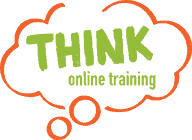Functional Skills Maths
Our guide to Functional Skills Maths: a government-backed alternative to GCSE Maths.
What is Functional Skills Maths?
The level 2 maths qualification is the the same as a GCSE Maths pass grade. (GCSE Maths 9 to 4 or A* to C in old GCSE grading system).
Functional Skills Maths helps people improve their maths skills in practical ways. Functional Skills Maths questions use real-life examples and situations.
Each of the five qualifications will help you develop maths skills needed for work and day-to-day life.
Do you need help with Functional Skills Maths? Start one of our Functional Skills Maths online courses with support from our maths tutors.
-
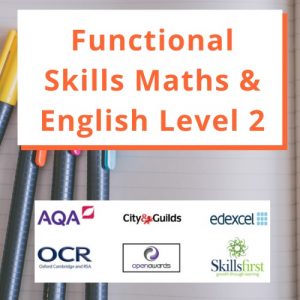
Maths And English Courses Level 2
From: £19.00 / month -
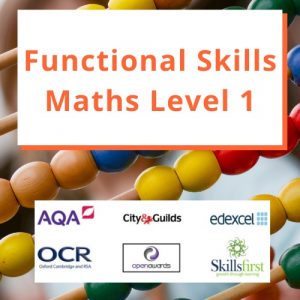
Functional Skills Maths Level 1 Online Course
From: £19.00 / month -
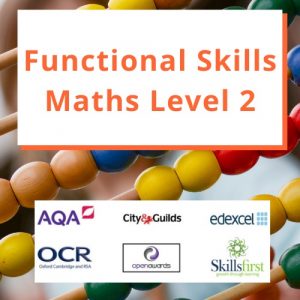
Functional Skills Maths Level 2 Online Course
From: £29.00 / month -
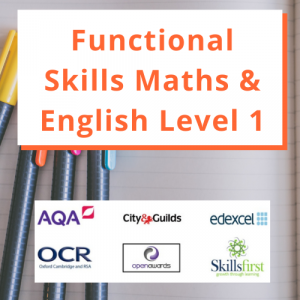
Level 1 Maths And English Course
From: £19.00 / month -

Entry Level 3 Functional Skills Maths Online Course
From: £29.00 / month -

Entry Level 3 Functional Skills English Online Course (Copy)
From: £29.00 / month
Why choose Functional Skills Maths?
The most popular reason to study Functional Skills Maths is if you need to retake your maths GCSE. If you failed GCSE Maths and need to resit this is the maths course for you. Especially if you want to retake GCSE Maths from home.
Achieving your Functional Skills Maths Level 2 will help you;
- Apply for a job that requires GCSE Maths pass grade
- Access higher education
- Enrol on an apprenticeship
- To start careers in nursing and teaching
- To go to University
- Improve your skills and confidence with day-to-day maths tasks
- Help your children with their maths homework
For some apprenticeships, you may only need Functional Skills Maths Level 1.
Is Functional Skills Maths a recognised qualification?
Yes, it’s also a nationally recognised qualification. By employers, education organisations and training companies. Accredited by examining bodies including;
- AQA
- City & Guilds
- NCFE
- NOCN
- OCR
- Pearson
The curriculum for Functional Skills Maths is set by the government.
You’ll receive a Functional Skills Maths certificate for each maths level.
Functional Skills Maths Assessment
You’ll need to complete an initial assessment and diagnostic before starting a course.
Functional Skills Maths Initial Assessment: this is an assessment of your maths skills level. The result of the assessment will help decide which maths level your course should start from.
Functional Skills Maths Diagnostic Test: this tests your strengths and weaknesses at your maths level. To help create your personal learning plan.
Where can I learn Functional Skills Maths?
You’ll need to complete an initial assessment and diagnostic before starting a course.
Functional Skills Maths Initial Assessment: this is an assessment of your maths skills level. The result of the assessment will help decide which maths level your course should start from.
Functional Skills Maths Diagnostic Test: this tests your strengths and weaknesses at your maths level. To help create your personal learning plan.
Functional Skills Maths Syllabus
Whole Numbers
Get back to basics and learn about working with whole numbers. The perfect first step to your maths qualification that will help you in all areas of your maths course. You’ll cover topics such as; subtraction, addition, multiplication and division.
Fractions, Decimals & Percentages
Percentages, fractions and decimals are common in personal and professional life. Whether you’re splitting a bill after a meal with friends, or working out how much you’ll save on office supplies with a discount card. Gain confidence working with real-life examples of percentages, fractions and decimals.
Shape & Space
Learn about 2D and 3D shapes, and how to work with width, depth and height. Discover characteristics of cylinders, spheres, pyramids, prisms, cubes and how to identify them. Improve your skills working with plans, diagrams and materials.
Common Measures
Learn to use common measurements such as metres, centimetres, kilograms and grams. Use real-life examples to calculate areas, perimeters, volumes and weights. Convert between imperial and metric measurements where appropriate.
Handling Data
Learn how to collect and record data, then represent it using information tables, charts and graphs. Analyse data to find averages, probability ranges, and predict the likelihood of potential outcomes. Where applicable, use information and communication technology (ICT) to help record and analyse data.
